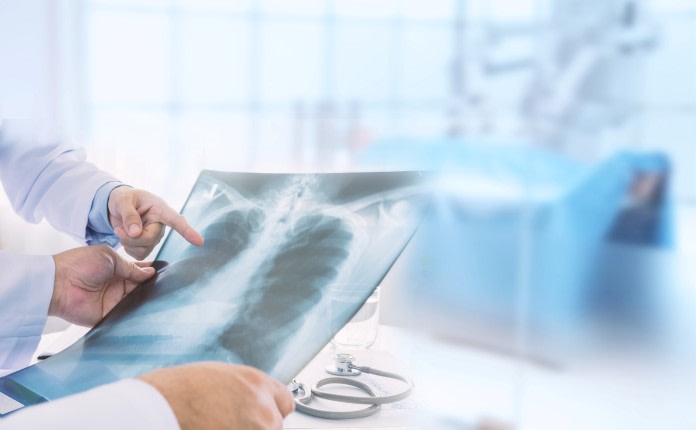What is pneumology?
Pneumology refers to the specialty concerned with the functioning of the respiratory system – lungs, bronchial tubes, pleura and trachea – and associated diseases:
- Sleep apnoea
- Chronic obstructive pulmonary disease, or COPD
- Asthma, and respiratory allergies
- Respiratory infections (pleurisy, bronchopneumonia, tuberculosis, legionellosis, etc.)
- Changes due to prolonged inhalation of a same type of dust (pneumoconiosis)
- Bronchopulmonary tumours,
- Respiratory failure
- Etc.
Given the consequences of oxygen depletion on the body, pneumology is closely linked to :
- Cardiology
- Neurology
- Internal medicine.

When to see a pulmonologist
A persistent cough, the abnormal secretion of bronchial mucus, shortness of breath accentuated by effort (dyspnea), chest pain, sleep disorders or even traces of blood in a sputum require consultation with a GP who will assess whether it is necessary to refer you to a pulmonologist. The risk of lung disease is higher among people who smoke, have high blood pressure or are exposed to certain substances such as sawdust, asbestos or cement. Once a pulmonary pathology is proven, it is no longer necessary to see a GP for medical monitoring.
What does a pulmonologist do?
Following a detailed questionnaire on the patient’s personal (childhood illnesses) and, in particular, family history, the pulmonologist will examine the patient with a stethoscope and check oxygen saturation using a sensor device on the finger to measure pulse rate, heart rate, body temperature and blood pressure. Blood gas analysis to assess oxygenation (arterial gasometry) or respiratory functional exploration (RFE) by spirometer can be performed directly at the pulmonologist’s practice or at a hospital. Other tests such as blood, urine or sputum analysis (tuberculosis), imaging (lung X-ray, chest CT scan, bronchial fibroscopy), stress tests or polysomnographic recording may be requested in order to make a diagnosis.
How do pneumology treatments work?
Depending on the condition, treatments can be administered orally or by injection or inhalation. It should be noted that the effectiveness of the treatment method greatly depends on strict compliance with the instructions for use of the inhalation device. Inhalation is also used to improve oxygenation (oxygen therapy) in case of respiratory failure and in case of sleep apnoea, when a continuous positive airway pressure mask is fitted. The pulmonologist can also resort to using respiratory rehabilitation, an outpatient programme focusing on respiratory physiotherapy, physical activity (re-training for effort, muscle strengthening and endurance), nutritional rehabilitation and psychological support, amongst others.
Vos questions fréquemment posées sur la pneumologie
Quels examens peut faire un pneumologue ?
Un pneumologue est un médecin spécialisé dans le diagnostic et le traitement des maladies respiratoires. Il peut effectuer ou demander divers examens pour diagnostiquer une maladie. Ces examens peuvent inclure des tests sanguins et d'urine, des radiographies pulmonaires, des analyses de gaz du sang, des tests respiratoires, des endoscopies, des tomodensitométries (scanner) thoraciques, des IRM, des angiographies et des biopsies.
Pneumologue ou allergologue : quelle différence ?
Les pneumologues sont spécialisés dans le traitement des maladies des poumons et du système respiratoire, tandis que les allergologues sont spécialisés dans le traitement des allergies et des maladies immunitaires.
Pourquoi choisir la pneumologie ?
La pneumologie est une spécialité médicale qui se consacre aux maladies des poumons et des voies respiratoires. Cette spécialité traite les maladies respiratoires graves telles que la mucoviscidose mais aussi des maladies infectieuses comme la tuberculose.


















